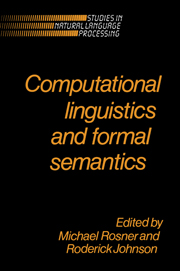Book contents
- Frontmatter
- Contents
- List of contributors
- Preface
- 1 Unification
- 2 Representations and interpretations
- 3 Syntactic categories and semantic type
- 4 Fine-structure in categorial semantics
- 5 Properties, propositions and semantic theory
- 6 Algorithms for semantic interpretation
- 7 Situation schemata and linguistic representation
- 8 Application-oriented computational semantics
- 9 Form and content in semantics
- 10 Epilogue: on the relation between computational linguistics and formal semantics
- Bibliography
1 - Unification
Published online by Cambridge University Press: 05 June 2012
- Frontmatter
- Contents
- List of contributors
- Preface
- 1 Unification
- 2 Representations and interpretations
- 3 Syntactic categories and semantic type
- 4 Fine-structure in categorial semantics
- 5 Properties, propositions and semantic theory
- 6 Algorithms for semantic interpretation
- 7 Situation schemata and linguistic representation
- 8 Application-oriented computational semantics
- 9 Form and content in semantics
- 10 Epilogue: on the relation between computational linguistics and formal semantics
- Bibliography
Summary
INTRODUCTION
This paper stands in marked contrast to many of the others in this volume in that it is intended to be entirely tutorial in nature, presupposing little on the part of the reader but a user's knowledge of English, a modicum of good will, and the desire to learn something about the notion of unification as it has come to be used in theoretical and computational linguistics. Most of the ideas I shall be talking about were first introduced to the study of ordinary language by computational linguists and their adoption by a notable, if by no means representative, subset of theoretical linguists represents an important milestone in our field, for it is the first occasion on which the computationalists have had an important impact on linguistic theory. Before going further, there may be some value in pursuing briefly why this rapprochement between these two branches has taken so long to come about. After all, the flow of information in the other direction – from theoretician to computationalist – has continued steadily from the start.
PRODUCTIVITY
The aspects of ordinary language that have proved most fascinating to its students all have something to do with its productivity, that is, with the fact that there appears to be no limit to the different utterances that can be made and understood in any of the languages of the world. Certainly, speakers can make and understand utterances that they have never made or understood before, and it is presumably largely in this fact that the immense power and flexibility of human language resides.
- Type
- Chapter
- Information
- Computational Linguistics and Formal Semantics , pp. 1 - 30Publisher: Cambridge University PressPrint publication year: 1992
- 39
- Cited by



